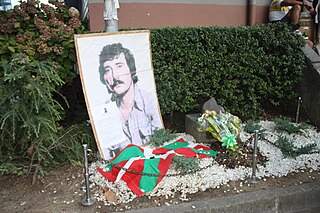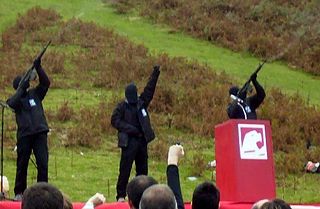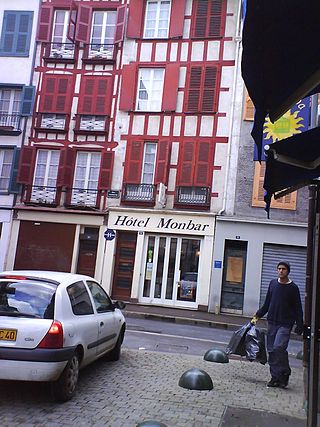Related Research Articles

GAL were death squads illegally established by officials of the Spanish government during the Basque conflict to fight against ETA, the principal Basque separatist militant group. They were active from 1983 to 1987 under Spanish Socialist Workers' Party (PSOE)-led governments.

The Basque conflict, also known as the Spain–ETA conflict, was an armed and political conflict from 1959 to 2011 between Spain and the Basque National Liberation Movement, a group of social and political Basque organizations which sought independence from Spain and France. The movement was built around the separatist organization ETA, which had launched a campaign of attacks against Spanish administrations since 1959. ETA had been proscribed as a terrorist organization by the Spanish, British, French and American authorities at different moments. The conflict took place mostly on Spanish soil, although to a smaller degree it was also present in France, which was primarily used as a safe haven by ETA members. It was the longest running violent conflict in modern Western Europe. It has been sometimes referred to as "Europe's longest war".

The 1980 Ispaster attack was a gun and grenade attack by the Basque separatist organisation ETA which occurred on 1 February 1980 near the Basque town of Ispaster. The targets were a convoy of civil guards who were escorting workers and weapons from the nearby Esperanza y Cia Arms factory to Bilbao. A total of six civil guards were killed, while two ETA members were killed by hand grenades that they had thrown. The attack was the deadliest of 1980, the year when ETA killed more people than any other.
A car bomb attack was carried out by the Basque separatist organisation ETA on 11 December 1987. A vehicle containing 250 kilograms (550 lb) of ammonal was parked beside the main Guardia Civil barracks in the city of Zaragoza, Aragon, Spain; its explosion killed 11 people, including 5 children. Another 88 people were injured, the majority of them civilians.
A car bomb attack was carried out by the armed Basque separatist group ETA in Madrid, Spain, on 14 July 1986, which killed 12 people and injured another 32. The dead were all members of the Guardia Civil studying in the nearby traffic school on Príncipe de Vergara. The ETA members later convicted of participation in the attack included significant figures in the group, including Antonio Troitiño and Iñaki de Juana Chaos.
The September 1982 Rentería attack was an ambush by the Basque separatist organisation ETA which occurred on 14 September 1982 on the motorway near the Basque town of Errenteria in Guipuzkoa. The targets were several national police officers, four of whom were killed in the attack, with the fifth seriously injured. The attack was ETA's deadliest of 1982.
The 1980 Markina attack was a mass shooting gun attack by the Basque separatist organisation ETA which occurred on 20 September 1980 near the Basque town of Markina. The targets were a group of off-duty civil guards who were having lunch in a bar in the town. Four civil guards were killed. The attack was one of the deadliest of 1980, the year when ETA killed more people than any other.
A car bombing was carried out by the Basque separatist organisation ETA on 16 September 1991 in the town of Mutxamel near Alicante. The target was the Civil Guard barracks in the town. However the bomb initially failed to explode near its target. The police treated the car as an abandoned vehicle, not realising that it contained a bomb and while being towed away, the car bomb exploded, killing two police officers and the civilian towing the car away. The bombing was the deadliest of the 40 attacks which ETA carried out in the Province of Alicante between 1979 and 2004.
A car bomb attack was carried out by the armed Basque separatist group ETA in the Puente de Vallecas district of Madrid, Spain on 11 December 1995, which killed 6 people and injured a further 19. The target was a camouflaged army vehicle which was transporting nine civilian employees of the army towards the nearby motorway.
Car bomb attacks were carried out by the armed Basque separatist group ETA in Madrid, Spain on 21 June 1993, killing 7 people and injuring a further 29. The target was an army vehicle transporting members of the army. The dead included four lieutenant colonels, a commander, a sergeant and the civilian driver of the vehicle. This was ETA's deadliest attack of 1993.

A car bombing was carried out by the armed Basque separatist group ETA in Sabadell, Catalonia, Spain on 8 December 1990.

The Monbar Hotel attack was carried out by the Grupos Antiterroristas de Liberación (GAL), a Spanish state-sponsored death squad, on 25 September 1985 in Bayonne, Pyrénées-Atlantiques, France. The targets were four members of the Basque separatist terrorist group Euskadi Ta Askatasuna (ETA), whom the Spanish government believed to be senior figures in the organization, itself proscribed as a terrorist group in Spain and France. All four people were killed, with a fifth person, apparently unconnected to ETA, injured in the shooting. This represented the deadliest attack carried out by the GAL. Although two of the participants were apprehended shortly after the shooting, controversy surrounded the possible involvement of senior figures in the Spanish police.
A car bombing was carried out by the armed Basque separatist group ETA in Madrid, Spain on 6 February 1992, killing 5 people and injured a further 7. The target was a military vehicle transporting members of the army. The dead included three captains, a soldier driving the vehicle and a civilian working for the armed forces. This was ETA's deadliest attack of 1992.
The 1980 Orio ambush was a gun and grenade attack by the Basque separatist organisation ETA which occurred on 13 July 1980 near the Basque town of Orio. The targets were a convoy of civil guards who had just finished their shift guarding the nearby munitions factory. Two civil guards were killed and three injured, while two ETA members were killed after the civil guards starting the new shift came to the assistance of their colleagues.
Far-right terrorism in Spain surged after the death of dictator Francisco Franco in 1975 and continued until the early 1980s. The term refers to the actions undertaken by fascist and far-right groups who were against the changes taking place during the transition to democracy, and essentially dedicated to street violence against persons of other ideologies.
Basque National Liberation Movement prisoners are all those people who have been imprisoned, placed on remand, or otherwise kept in custody due to their illegal activity in support of the Basque National Liberation Movement.

The last use of capital punishment in Spain took place on 27 September 1975 when two members of the armed Basque nationalist and separatist group ETA political-military and three members of the Spanish anti-Francoist Marxist–Leninist group Revolutionary Antifascist Patriotic Front (FRAP) were executed by firing squads after having been convicted and sentenced to death by military tribunals for the murder of police officers and civil guards. Spain was Western Europe's only dictatorship at the time and had been unpopular and internationally isolated in the post-war period due to its relations with Nazi Germany in the 1930s and 1940s and the fact that its autocratic leader, Francisco Franco, had come to power by overthrowing a democratically elected government. As a result, the executions resulted in substantial criticism of the Spanish government, both domestically and abroad. Reactions included street protests, attacks on Spanish embassies, international criticism of the Spanish government and diplomatic measures, such as the withdrawal of the ambassadors of fifteen European countries.

The Altsasu incident is a judicial case against eight young people from Altsasu, a small town in Navarre, Spain, for their involvement in a fight taking place on 15 October 2016 at a bar in which two off-duty Civil Guard officers stationed in the town and their girlfriends sustained injuries. One of the officers was knocked down, with the other victims reported to have suffered "psychological trauma". The lawsuit was initially conducted by the judge of the Spanish special court Audiencia Nacional Carmen Lamela. As of March 2018, Concepción Espejel was appointed as magistrate ahead of the trial held in late April.
José Ignacio Iruretagoyena was a Spanish politician and victim of terrorism of the Basque separatist group Euskadi Ta Askatasuna (ETA).
References
- ↑ ETA:Historia de 40 años de terrorismo Archived 2011-07-24 at the Wayback Machine , ABC, 2006
- ↑ Timeline: Eta campaign, BBC News, 8 September 2010 accessed 1 May 2012
- ↑ Victimas de ETA Archived May 12, 2012, at the Wayback Machine , El Pais, accessed 2 May 2012
- ↑ Contra el terrorismo en el Pais Vasco, La Vanguardia, 2 November 1980, p5-6
- 1 2 El fiscal solicita 265 años para un 'etarra' acusado de la muerte de cinco personas, El Pais, 11 March 1988
- 1 2 La Vanguardia 5 November 1980, p16
- ↑ La Vanguardia, 4 November 1980, p5
- ↑ ABC (Sevilla), 26 April 1988, p22
- ↑ El Supremo confima la condena de 200 años impuesta a 'Baldo' por el asesinato de cinco personas en Zarautz, La Vanguardia, 20 March 2003